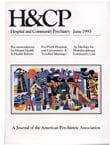Substance Abuse and Onset of Psychotic Illness
Abstract
Objective: This study examined the relationship of substance abuse history to psychotic diagnosis and clinical presentation in a sample of 188 subjects with newly diagnosed psychotic illness. Methods: Subjects were assessed using a structured diagnostic interview and clinical rating scales. The diagnosis and demographic and clinical characteristics of subjects with a substance abuse history were compared with those of subjects without a substance abuse history. Data for males and females were considered separately in most analyses. Result: Substance abuse history was unrelated to initial diagnosis, age at onset of psychotic symptoms, ratings of best and worst levels of functioning, or severity of positive symptoms. Substance abuse was significantly associated with higher anxiety and depression scores on the Brief Psychiatric Rating Scale. Males without substance abuse had more negative symptoms and were less likely to have attempted suicide than males with substance abuse. Conclusions: Substance abuse appears to have limited influence on the clinical presentation of non-substance-induced psychotic disorders.
Access content
To read the fulltext, please use one of the options below to sign in or purchase access.- Personal login
- Institutional Login
- Sign in via OpenAthens
- Register for access
-
Please login/register if you wish to pair your device and check access availability.
Not a subscriber?
PsychiatryOnline subscription options offer access to the DSM-5 library, books, journals, CME, and patient resources. This all-in-one virtual library provides psychiatrists and mental health professionals with key resources for diagnosis, treatment, research, and professional development.
Need more help? PsychiatryOnline Customer Service may be reached by emailing [email protected] or by calling 800-368-5777 (in the U.S.) or 703-907-7322 (outside the U.S.).



